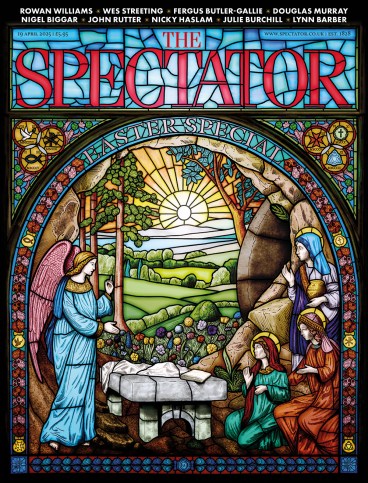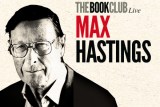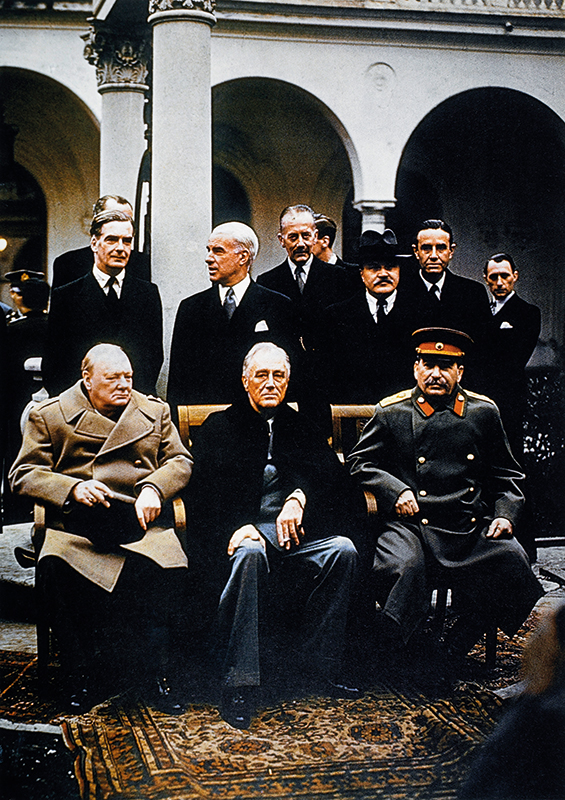
‘Allies,’ declared Stalin on 8 February 1945, the fifth day of the Yalta Conference, ‘should not deceive one another.’ In order to defeat Hitler, Mussolini and the Japanese, the British, Americans, Soviets, French and Chinese had indeed all worked closely together. But in his meticulous, scholarly and highly enjoyable history of the second world war, Tim Bouverie makes plain just what this entailed: a collaboration that was both deep and rivalrous, riven by secret deals, prejudice, changing loyalties and betrayals, conducted by people who at different times admired, feared and despised one another, while in public most often remaining models of civility.
All the great set pieces are here – Dunkirk, Pearl Harbor, the German invasion of the Soviet Union, the Normandy landings – as Bouverie traces the twists and turns of a war that lasted five years and nine months, moving from theatre to theatre, dying down in one place only to ignite in another, turning friends into enemies and enemies into friends. But no less interesting are the many sideshows: the disastrous attempt to take Trondheim in April 1940, when Allied soldiers ‘looking like paralysed bears’ floundered in snow drifts; the lengths to which the British went to keep Spain neutral; or the Iraqi revolt of May 1941.
Bouverie was unable to consult the Russian archives, but he has delved deep into the collections available to him throughout the rest of the world, along with the diaries, notes, memoirs and dispatches of an enormous cast of characters, many of whom were shrewd observers, excellent writers and very witty. He is particularly good at bringing them to life with well chosen quotations and pen portraits. Harry Hopkins, Roosevelt’s friend and emissary, whose chronic ill health had made him very thin, was described by one British diplomat as looking like ‘an animated piece of shredded wheat’. Paul Reynaud, the French prime minister, with his narrow eyes and natural smirk, was said to have the ‘countenance of a Samurai educated at Cambridge’, while the Soviet foreign minister Vyacheslav Molotov had ‘small, deep-set eyes’ and the ‘smile of a Siberian winter’. Anthony Eden was ‘a sartorial symphony’.
The crucial importance of personal relations, not just between Churchill, Roosevelt and Stalin but between individual ministers and diplomats, and the way that friendships and animosities shaped events, is the central theme of the book. ‘It is fun,’ wrote Roosevelt to Churchill, at a moment of closeness, ‘to be in the same decade as you.’ The Allies, separated by differences of ideology, disagreements over strategy and the sort of peace they sought, entered the war carrying ancestral grudges and profound suspicion of one another. The Americans deplored British colonialism while conveniently forgetting their own racial segregation. There was endless friction over the ‘ruthlessly determined’ Charles de Gaulle, one British officer suggesting that he should be locked up in a lunatic asylum and Churchill wondering whether he had ‘created a monster’. As General Sir Leslie Hollis put it: ‘Roosevelt was suspicious of Churchill, and Stalin was suspicious of everybody. But outwardly they were great buddies.’ As Bouverie writes: ‘Only Hitler could have brought them together.’
The meetings between the Big Three – in Teheran, Casablanca and Yalta – are portrayed as times of great emotional intensity, the leaders playing with words, the diplomats jostling with misconceptions and perceived slights, all sides trying to avoid possibly catastrophic consequences of misunderstandings while accepting deals doomed to disaster even as they were being made. In retrospect, Yalta, the last of the meetings, when Roosevelt was dying, came to be seen as a synonym for gullibility, duplicity and betrayal, though both Roosevelt and Stalin went home saying that never in history had there been so close an alliance. ‘Yalta,’ noted the British historian Chester Wilmot, was ‘Stalin’s greatest victory.’ It took just four weeks before the long betrayal of Poland, over which the Allies had gone to war, was completed by Stalin’s annexation of great swathes of territory and the despatch of thousands of members of the Home Army, along with Latvians, Lithuanians, Estonians and Cossacks, to gulags in the far north.
Bouverie’s account of the last year of the war makes for bitter reading today. Much thinking went into what would happen after the fighting ended and Germany was dismembered, with Europe ‘peaceful and happy’ in a United Nations and Roosevelt convinced that world peace would depend on the closest possible co-operation between the US and USSR. Britain’s ‘special relationship’ with America was indeed special then, described by one official as ‘the largest, most integrated, most collegiate military alliance in history’. It is impossible not to read Allies at War without constantly reflecting on the days when diplomats were highly trained, extremely knowledgeable and intelligent, and generals and national leaders had vision and resolve; or on Churchill’s wistful words, written long after the war, about the years in which ‘we seemed to be friends’.
For all the strategic errors and many dis-agreements, for all the 75 million dead and countless numbers displaced, the Allies did indeed defeat the Axis powers, and the foundations of a new world order were laid in the shape of the United Nations, the World Bank and the International Monetary Fund. But the cooperation did not last. Fresh rivalry, suspicion, the Cold War and the arms race quickly followed. In the end, no one nation had really understood another. It had been, as Adolf Berle, assistant secretary of state, put it, simply a ‘temporary confluence of interests’.








Comments